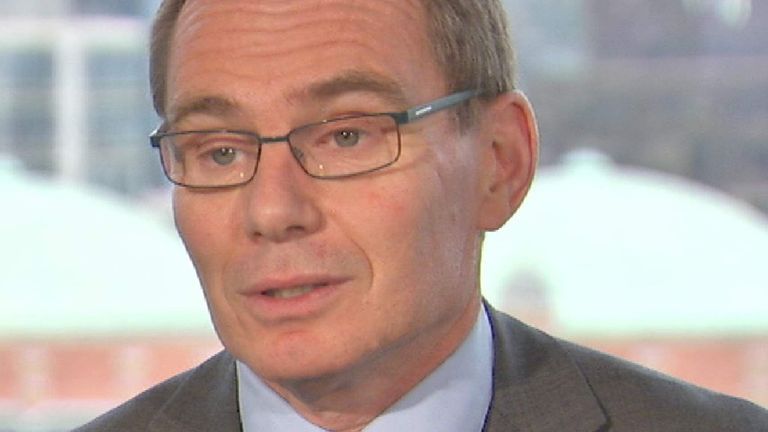Boss of mining giant BHP sounds warning over rise of nationalism
Chief executive Andrew Mackenzie says there has been a "slight cooling in appetite" amid concerns over the global economy.
Wednesday 21 August 2019 06:10, UK
It's the world's biggest mining company by stock market valuation, a 拢97bn giant that is among the largest businesses in the FTSE 100.
Yet that does not mean BHP is too big to be perturbed by certain developments in the global economy.
Andrew Mackenzie, BHP's chief executive for more than six years, sounded a warning today about the rise of nationalism and the escalation of the trade dispute between the US and China - saying both posed a threat to the world economy.
He said: "There is no doubt that while this continues, it is actually putting a bit of a dampener on world economic growth and certainly the prospects for world economic growth, that ultimately - if not yet - will impact the demand for our products.
"More generally, I would say we do feel there is a number of things abroad right now where increased nationalism and an increased assertion by governments to interfere in global trade flows and global supply chains and, indeed, just the good business of capitalism and free enterprise and free competition, is a consideration."
Mr Mackenzie, a chemist who worked for BP for 22 years and for rival miner Rio Tinto before joining BHP, insisted that the trade war between the US and China - the company's biggest single customer - was not yet hitting commodity demand.
But he added: "There's obviously been a slight cooling in appetite based on some of the concerns we have seen in the short-term for the global economy.
"We are not without some consideration as to what might be around the corner."
The Scotsman, who has a PhD in organic chemistry and who as a scientist published more than 50 academic papers, said there was a balance to be struck between how BHP manages its relationship with the government in countries like China and with governments in liberal democracies like Australia, where BHP has a significant part of its operations.
He went on: "We shouldn't move away from the fact that China really wants iron ore, really wants our metallurgical coal and probably depends on some of our copper."
He was speaking as BHP reported a 2% rise in underlying profit, to $9.12bn (£7.49bn), for the year to the end of June.
That reflected a jump in iron ore prices - which recently surged to their highest level for five-and-a-half years - and cuts in production costs, but was slightly lower than investors had been expecting, sending shares of BHP a little lower.
The company is also paying a record dividend at the full year stage of 78 US cents (64p) per share.
This will be worth a total of $3.9bn (£3.2bn) to BHP's shareholders and means the total pay-out for the year is up by 13% on last year.
The big question for those investors is whether this will be as good as it gets.
Mr Trump's trade dispute with China has already rattled the oil price and BHP itself has admitted it expects commodity prices to come off the boil during its current financial year.
Yet the signs are that BHP is better placed to withstand any drop in commodity prices better than both it and other miners have in the past.
The end of the so-called commodity 'super-cycle' in the first decade of the 21st century, reflecting explosive population growth in emerging markets like China and India, left the big mining companies with heavy debts after they snapped up assets and invested heavily on extra production in an attempt to meet increased demand.
Under Mr Mackenzie, BHP has accordingly spent much of the last few years reshaping its portfolio, including the demerger of an unwanted collection of metal and mining assets that it hived off into a separate company called South 32.
It also decided to offload its US shale oil assets and, in July last year, these were sold to BP for $10.5bn (£8.6bn).
Some of those sale proceeds were used to reduce BHP's debts which, during the latest financial year, were cut by 16% to $9.2bn (£7.6bn).
Some investors are now speculating that, having completed all of this housekeeping while at the same time having presided over a spectacular improvement in productivity (iron ore production has risen by 20% during the last five years while iron ore production costs have been halved), Mr Mackenzie may step down in the near future.
Mr Mackenzie himself was today playing down such speculation and insisting he was enjoying the job.
And the wider world, not just BHP's shareholders, could be forgiven for hoping he does stick around.
For Mr Mackenzie has proved himself to be one of the industry's more thoughtful figures in discussing issues like climate change.
During a speech last month, he announced plans under which BHP would become the first mining company not only to seek to reduce its own greenhouse gas emissions but to also set targets to reduce so-called 'Scope 3' emissions, those caused by customers using its resources.
That move will not have earned him many friends among other mining companies or, indeed, among oil and gas producers.
The company has also withdrawn from the World Coal Association, the main industry body, due to disagreements over climate change.
Such behaviour has not endeared him to some Australian politicians or, for that matter, some green campaigners - who have pointed out that BHP is not stepping back from thermal coal production as rapidly as rivals like Rio or Anglo American.
But it is nonetheless bold coming from the boss of a company like BHP.






